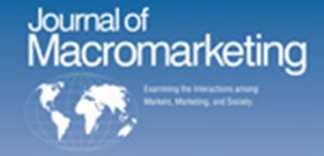
A special issue for the Journal of Macromarketing will focus on developing scholarship at the intersection of neo- institutional theory and marketing.
Important dates and information about the Special Issue for Journal of Macromarketing:
Submissions are due no later than January 15, 2020 at http://mc.manuscriptcentral.com/jmk.
Indicate that your paper is intended for this special issue. Manuscripts guidelines are available at: http://jmk.sagepub.com/. Please direct any inquiries about the special issue to nitmkg2@sciencesconf.org. We expect the special issue to be published in 2021.
A key part of macromarketing concerns understanding the institutions that surround marketing
and consumption. This special issue aims at understanding the role of inter-organizational
interplay in the emergence, maintenance and decline of consumption practices. Because the
customer cannot be considered as passive, companies are no longer the unique agent of making
markets.
We expect fresh knowledge that challenges the conventional view of market agents and the
dynamic of consumption-practices evolution through the lens of institutional theory. We also
encourage papers that widen the contexts and the boundaries of interactions between consumers
and companies and that focus on specific actors such as voiceless and/or powerless consumers.
Our preference will also go to papers that explore big issues for society, such as climate change,
waste management, gender issues, social inclusion, and social media. Contributions to our
knowledge about the interplay of micro and macro-levels are especially welcome.
In conjunction with the “Bringing Institutional Theory to Marketing” conference at ISC Business
School in Paris, June 6-7, we are inviting papers on the topic of institutions in marketing.
Participation in the conference is not required for submission, but we will be considering papers
presented at the conference in addition to the open call for submissions.
Topics covered in the special issue could include but are not limited to:
- Institutions in the rise (or maintenance or decline) of consumption or marketing practices,
- How illegitimate consumption or marketing practices evolve over time. Why do some
illegitimate of these practices become legitimate whereas others disappear?
- The role of consumers as agents in the shaping of macro-level consumption practices,
- Going beyond the firm-consumer dyad - the role of media, critics, technology and
professions in legitimating and delegitimizing consumption or marketing practices,
- How collaborative dynamics among companies legitimate new market-products or
marketing practices and new consumption-practices in emerging industries



